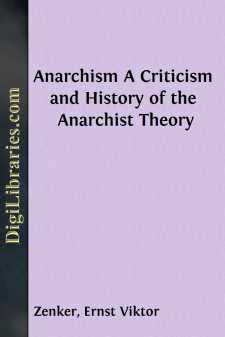Categories
- Antiques & Collectibles 13
- Architecture 36
- Art 48
- Bibles 22
- Biography & Autobiography 813
- Body, Mind & Spirit 142
- Business & Economics 28
- Children's Books 17
- Children's Fiction 14
- Computers 4
- Cooking 94
- Crafts & Hobbies 4
- Drama 346
- Education 46
- Family & Relationships 57
- Fiction 11829
- Games 19
- Gardening 17
- Health & Fitness 34
- History 1377
- House & Home 1
- Humor 147
- Juvenile Fiction 1873
- Juvenile Nonfiction 202
- Language Arts & Disciplines 88
- Law 16
- Literary Collections 686
- Literary Criticism 179
- Mathematics 13
- Medical 41
- Music 40
- Nature 179
- Non-Classifiable 1768
- Performing Arts 7
- Periodicals 1453
- Philosophy 64
- Photography 2
- Poetry 896
- Political Science 203
- Psychology 42
- Reference 154
- Religion 513
- Science 126
- Self-Help 84
- Social Science 81
- Sports & Recreation 34
- Study Aids 3
- Technology & Engineering 59
- Transportation 23
- Travel 463
- True Crime 29
Anarchism A Criticism and History of the Anarchist Theory
Description:
Excerpt
n the day of the bomb outrage in the French Parliament I gave an impromptu discourse upon Anarchism to an intelligent audience anxious to know more about it, touching upon its intellectual ancestry, its doctrines, propaganda, the lines of demarcation that separate it from Socialism and Radicalism, and so forth. The impression which my explanations of it made upon my audience was at the same time flattering and yet painful to me. I felt almost ashamed that I had told these men, who represented the pick of the middle-class political electorate, something entirely new to them in speaking of matters which, considering their reality and the importance of the question, ought to be familiar to every citizen. Having thus had my attention drawn to this lacuna in the public mind, I was induced to make a survey of the most diverse circles of the political and Socialist world, both of readers and writers, and the result was the resolve to extend my previous studies of Anarchism (which had not extended much beyond the earliest theorists), and to develop my lecture into a book. This book I now present to my readers.
The accomplishment of my resolve has been far from easy. What little literature exists upon the subject of Anarchism is almost exclusively hostile to it, which is a great drawback for one who is seeking not the objects of a partisan, but simply and solely the truth. One had constantly to gaze, so to speak, through a forest of prejudices and errors in order to discover the truth like a little spot of blue sky above. In this respect I found it mattered little whether I applied to the press, or to the so-called scientific Socialists, or to fluent pamphleteers.
"In vielen Worten wenig Klarheit,Ein Fünkchen Witz und keine Wahrheit."Laveleye, for instance, does not even know of Proudhon; for him Bakunin is the only representative of Anarchism and the most characteristic; Socialism, Nihilism, and Anarchism mingle together in wild confusion in the mind of this social historian. Garin, who wrote a big book, entitled The Anarchists, is not acquainted with a single Anarchist author, except some youthful writings of Proudhon's and a few agitationist placards and manifestoes of the modern period. The result of this ignorance is that he identifies Anarchism completely with Collectivism, and carries his ridiculous ignorance so far as to connect the former Austrian minister Schäffle, who was then the chief adviser of Count Hohenwart, in some way or other with the Anarchists. Professor Enrico Ferri, again, exposes his complete ignorance of the question at issue sufficiently by branding Herbert Spencer as an Anarchist. In fact, the only work that can be called scientifically useful is the short article on "Anarchism" in the Cyclopædia of Political Science, from the pen of Professor George Adler. All pamphlets, articles, and essays which have since appeared on the same subject are, conveniently but uncritically, founded upon this short but excellent essay of Adler's. Since the extraordinary danger of Anarchist doctrines is firmly fixed as a dogma in the minds of the vast majority of mankind, it is apparently quite unnecessary to obtain any information about its real character in order to pronounce a decided, and often a decisive, judgment upon it. And so almost all who have hitherto written upon or against Anarchism, with a few very rare exceptions, have probably never read an Anarchist publication, even cursorily, but have contented themselves with certain traditional catchwords.
As a contrast to this, it was necessary, for the purposes of a critical work upon Anarchism, to go right back to its sources and to the writings of those who represented it. But here I found a further difficulty, which could not always be overcome. Where was I to get these writings? Our great public libraries, whose pride it is to possess the most complete collections possible of all the texts of Herodotus or Sophocles, have of course thought it beneath their dignity to place on their shelves the works of Anarchist doctrinaires, or even to collect the pamphlet literature for or against Anarchism—productions which certainly cannot take a very high rank from the point of view either of literature or of fact....


